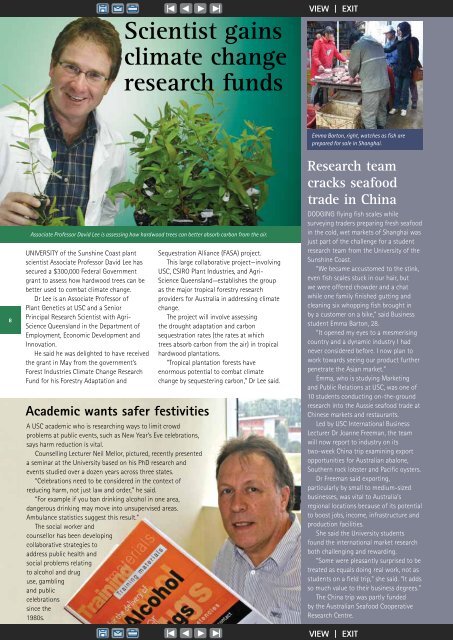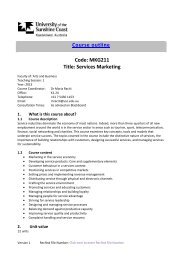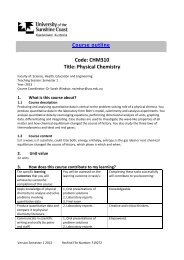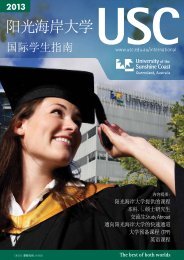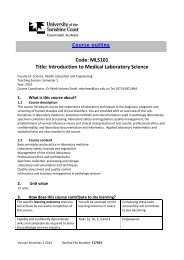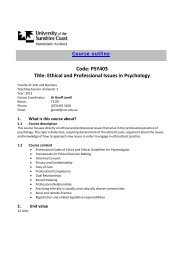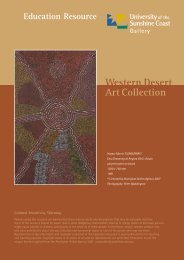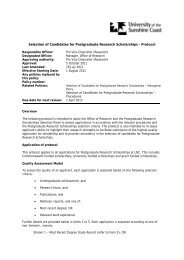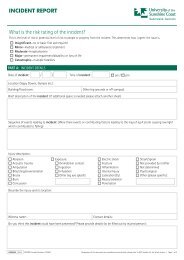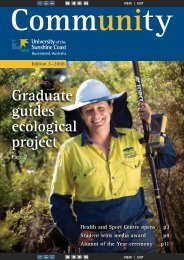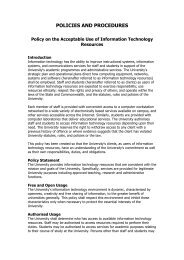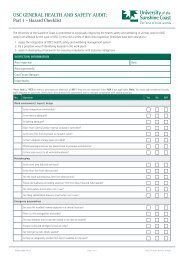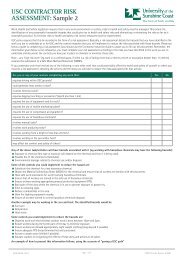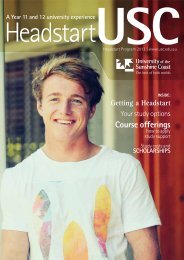Edition 2, 2010 (PDF 2.1MB) - University of the Sunshine Coast
Edition 2, 2010 (PDF 2.1MB) - University of the Sunshine Coast
Edition 2, 2010 (PDF 2.1MB) - University of the Sunshine Coast
- No tags were found...
Create successful ePaper yourself
Turn your PDF publications into a flip-book with our unique Google optimized e-Paper software.
Scientist gainsclimate changeresearch fundsVIEW | EXITEmma Barton, right, watches as fish areprepared for sale in Shanghai.8Associate Pr<strong>of</strong>essor David Lee is assessing how hardwood trees can better absorb carbon from <strong>the</strong> air.<strong>University</strong> <strong>of</strong> <strong>the</strong> <strong>Sunshine</strong> <strong>Coast</strong> plantscientist Associate Pr<strong>of</strong>essor David Lee hassecured a $300,000 Federal Governmentgrant to assess how hardwood trees can bebetter used to combat climate change.Dr Lee is an Associate Pr<strong>of</strong>essor <strong>of</strong>Plant Genetics at USC and a SeniorPrincipal Research Scientist with Agri-Science Queensland in <strong>the</strong> Department <strong>of</strong>Employment, Economic Development andInnovation.He said he was delighted to have received<strong>the</strong> grant in May from <strong>the</strong> government’sForest Industries Climate Change ResearchFund for his Forestry Adaptation andAcademic wants safer festivitiesA USC academic who is researching ways to limit crowdproblems at public events, such as New Year’s Eve celebrations,says harm reduction is vital.Counselling Lecturer Neil Mellor, pictured, recently presenteda seminar at <strong>the</strong> <strong>University</strong> based on his PhD research andevents studied over a dozen years across three states.“Celebrations need to be considered in <strong>the</strong> context <strong>of</strong>reducing harm, not just law and order,” he said.“For example if you ban drinking alcohol in one area,dangerous drinking may move into unsupervised areas.Ambulance statistics suggest this result.”The social worker andcounsellor has been developingcollaborative strategies toaddress public health andsocial problems relatingto alcohol and druguse, gamblingand publiccelebrationssince <strong>the</strong>1980s.Sequestration Alliance (FASA) project.This large collaborative project—involvingUSC, CSIRO Plant Industries, and Agri-Science Queensland—establishes <strong>the</strong> groupas <strong>the</strong> major tropical forestry researchproviders for Australia in addressing climatechange.The project will involve assessing<strong>the</strong> drought adaptation and carbonsequestration rates (<strong>the</strong> rates at whichtrees absorb carbon from <strong>the</strong> air) in tropicalhardwood plantations.“Tropical plantation forests haveenormous potential to combat climatechange by sequestering carbon,” Dr Lee said.Research teamcracks seafoodtrade in ChinaDodging flying fish scales whilesurveying traders preparing fresh seafoodin <strong>the</strong> cold, wet markets <strong>of</strong> Shanghai wasjust part <strong>of</strong> <strong>the</strong> challenge for a studentresearch team from <strong>the</strong> <strong>University</strong> <strong>of</strong> <strong>the</strong><strong>Sunshine</strong> <strong>Coast</strong>.“We became accustomed to <strong>the</strong> stink,even fish scales stuck in our hair, butwe were <strong>of</strong>fered chowder and a chatwhile one family finished gutting andcleaning six whopping fish brought inby a customer on a bike,” said Businessstudent Emma Barton, 28.“It opened my eyes to a mesmerisingcountry and a dynamic industry I hadnever considered before. I now plan towork towards seeing our product fur<strong>the</strong>rpenetrate <strong>the</strong> Asian market.”Emma, who is studying Marketingand Public Relations at USC, was one <strong>of</strong>10 students conducting on-<strong>the</strong>-groundresearch into <strong>the</strong> Aussie seafood trade atChinese markets and restaurants.Led by USC International BusinessLecturer Dr Joanne Freeman, <strong>the</strong> teamwill now report to industry on itstwo-week China trip examining exportopportunities for Australian abalone,Sou<strong>the</strong>rn rock lobster and Pacific oysters.Dr Freeman said exporting,particularly by small to medium-sizedbusinesses, was vital to Australia’sregional locations because <strong>of</strong> its potentialto boost jobs, income, infrastructure andproduction facilities.She said <strong>the</strong> <strong>University</strong> studentsfound <strong>the</strong> international market researchboth challenging and rewarding.“Some were pleasantly surprised to betreated as equals doing real work, not asstudents on a field trip,” she said. “It addsso much value to <strong>the</strong>ir business degrees.”The China trip was partly fundedby <strong>the</strong> Australian Seafood CooperativeResearch Centre.VIEW | EXIT


